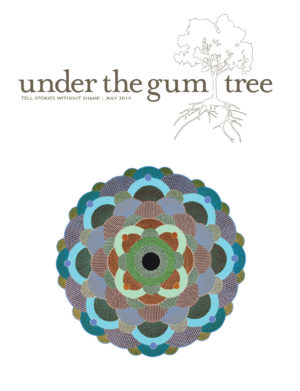Rob Freedman

Robert Freedman is another of Under the Gum Tree’s most recent contributors from our summer issue that we’d love for you to meet –because we loved meeting him too. Robert is both a writer and teacher, writing for over forty years and teaching for thirty. His novel, Fancypants: an autobiographical novel, was published in 2008 and other works of his have appeared in Tikkun, Drash, Philadelphia Stories, Still Crazy, and many others.
Here is Robert on his writing habits, career, and idiosyncrasies:
When and why did you start writing?
I started writing when I was a teenager. My first attempts were short stories like the kind I saw in the copies of Playboy I hid under my bed. I even submitted one of my adolescent stories to Playboy. I now have absolutely no idea what it was about, though I’m sure I tried to include numerous sex scenes, which I knew even less about than writing.
Where do you find your biggest inspiration when you write?
My only guiding inspirations when I write are: 1. To tell a good story and 2. To be as honest as I can possibly be.
Do you have a writing schedule?
I try to, but I’m not always successful in keeping to it. At my age, though, I’m not really worried about schedules anymore. I don’t feel like I have to keep my feet to the fire like I did when I was younger.
What is the hardest part of writing for you?
Facing the blank piece of paper. I have evolved lots of techniques that I use with my students to get them past this hurdle, but I’m not as good at getting myself over it. Having a deadline, whether real or artificial, can be a big help in getting past the blank page.
What do you enjoy most about writing?
Like Dorothy Parker famously said, “I hate writing. I love having written.” I mostly agree with that. Writing is really difficult and painful, but the rewards are great. There is a part that I do like, in fact, almost live for. And that is the moment in writing when I feel lost, swept up into my own story, on automatic pilot, enjoying the ride. It doesn’t happen all that often, but enough to keep me addicted to the process.
How long does it usually take you to finish a story?
It’s different for every story. Some get written in a day, some take years. “Rescue” the story in this issue of Under The Gum Tree, I worked on (off and on) for over three years. I’m still not sure it’s done. In fact, I’m sure it’s not.
Are you working on anything now?
Yes. I’m working on a long autobiographical piece about Judaism and my sometimes-tortured relationship to my people, religion, and culture.
Do you have any advice for other writers?
Try to answer the question, Why do I want to write? If you’re not sure of the answer or if the answer is because you want fame and fortune, I’d consider another line of work.
Is there anything else you would like to share with the readers?
At the risk of sounding pedantic (though I think I’m entitled, having taught for over 30 years), I think all of us writers need to really study and understand the basics of the language – i.e. spelling, grammar, usage, sentence structure. I don’t mind reading sentence fragments, if I know that the author understands she is using them for effect, artistically if you will. If I suspect, however, it’s because she doesn’t understand that a complete sentence must include a subject and a verb, I’m turned off. So there. (a fragment)




